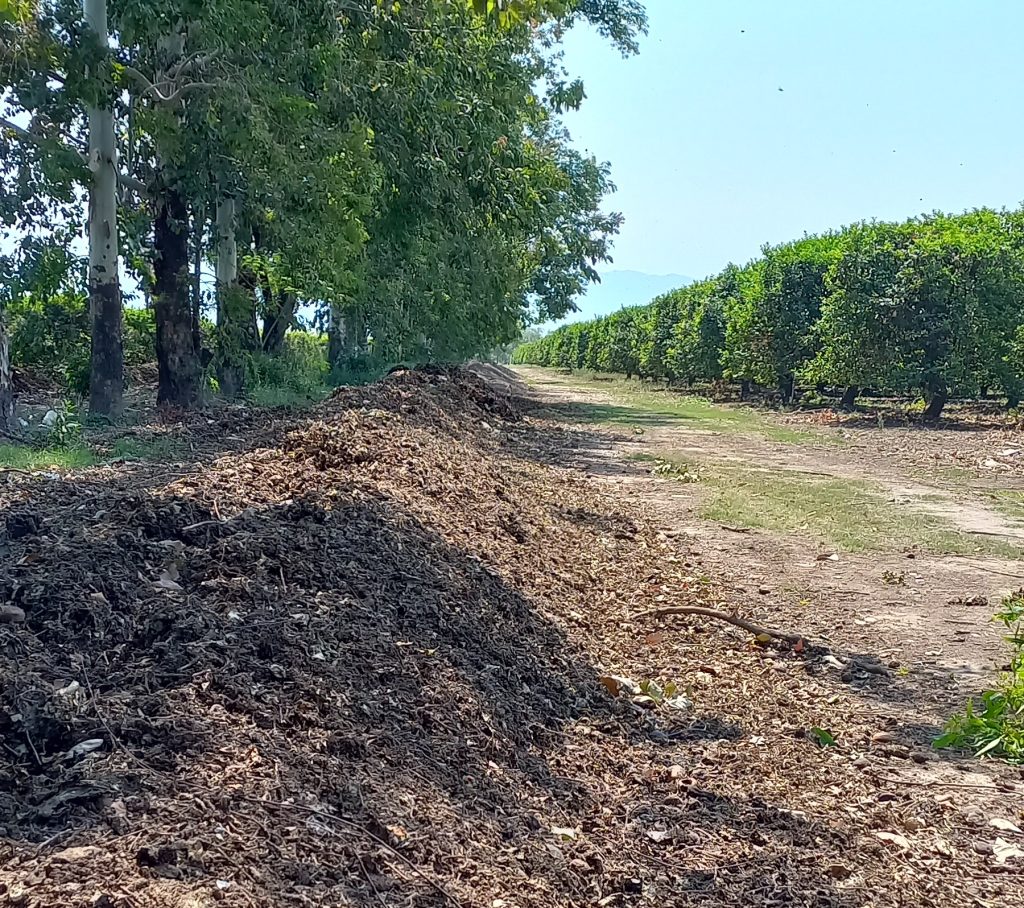The compost process consists of degrading organic matter by means of oxidation and the action of different microorganisms in the garbage. Compost is the result of a biological process intended to stabilize and clean the organic waste: it’s a great fertilizer. This process of decomposing takes place from five to eight months, approximately.
Benefits:
- It reactivates the polluted or degraded soil.
- It helps to recycle organic solid waste.
- It improves physical properties, it increases the water retention capacity, and it reduces the erosion hazard.
- It improves chemical properties because it grants macro and micro nutrients.
- It improves the microbial activity, that is fundamental in the transformation of insoluble materials into nutrients.
- It helps to control soil pathogens.
In our case, organic matter comes from different stages of the process. The harvested lemon arrives into the packing plant. Those lemons that do not qualify due to quality, size, shape or color, are sent to industry. The fruit that does not qualify for industry because it is rotten, it has a disease or bruises, will be sent to compost. Organic solid waste from productive processes is also used similarly. No vegetable material is discarded, everything is reused. This is one of the actions we adopt from Argenti Lemon in order to reduce the environmental impact of our production.
Every year, Argenti Lemon composts approx. 600 tons of organic waste coming from our industry and packing. This process takes place in San Justo Oeste, a farm located near the Industry. Firstly, the soil is defined piling up the solid organic waste which may reach 4,200 m in a line. At this stage, a backhoe is used.
The Compost process consists of 4 phases:
- Mesophilic phase
- Thermophilic or sanitizing phase
- Mesophilic phase or cooling phase
- Ripening phase
The first weeks of the process, all the piles in the compost raise their temperature up to 45°C -mesophilic phase- since the microbial activity is high, using the C and N, releasing heat and degrading the soluble compounds. In the following phase -thermophylic- the temperature goes over 45°C, releasing pathogens and weed seeds, hence obtaining a sanitized product. In the mesophilic phase, the temperature decreases again to 40° C and the mesophilic microorganisms get reactivated. Finally, the ripening phase comes, when humic and fulvic acids will be formed.

In every phase, we must control:
- Temperature
- Humidity -fundamentally- because in case it is excessive, the material will go bad. In order to avoid it, in Argenti we use Renova 4.0, a machine moving the rows to generate air in the center and avoid that tragic end. In contrast, if it is too dry, it should be watered so that the microorganisms may carry out the process.
- The pH: The pH meter punches the compost, and this indicates whether the pH is correct for the phase. In some cases, some humic and fulvic acids are added to improve or accelerate some of these processes and then improve the effect of the microorganisms.
At least once a week, it is recommended to remove the material.
Along the months, the landscape of the farm changes its color. At the beginning, we may observe 100% of the compost piled up in lines and as time passes, that shape decreases, loses water and changes its color due to the work of the great allies: the microorganisms.
After 6 months, the size of the compost is reduced 60%; the landscape this time looks different. This time, we can appreciate small heaps, earth-colored and rich in components and nutrients. It is the living soil, our organic soil.
We are 5 people in charge of this process in Argenti Lemon, but there are many other people helping to make it happen. This activity is highly beneficial in every sense: we reduce pollution, we enrich our soil, we learn to care for our resources, and we can work creatively in teams, discovering upgrades and new ways to work the soil every season.

